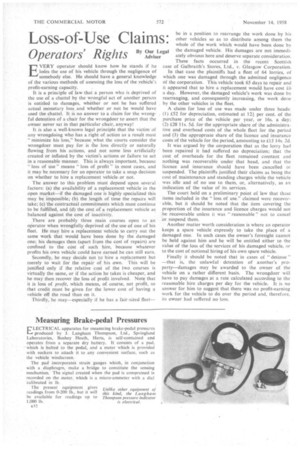Loss-of-Use Claims:
Page 66

If you've noticed an error in this article please click here to report it so we can fix it.
Operators' Rights By Our Legal g a l EVERY operator should know how he stands if he loges the use of his vehicle through the negligence of somebody else. He should have a general knowledge of the various methods of assessing the loss of the vehicle's profit-earning capacity.
It is a principle of law that a person who is deprived of the use of a chattel by the wrongful act of another person is entitled to damages, whether or not he has suffered actual monetary loss, and whether or not he would have used the chattel. It is no answer to a claim for the wrongful detention of a chair for the wrongdoer to assert that the owner never sat in that particular chair, anyway!
It is also a well-known legal principle that the victim of any wrongdoing who has a right of action as a result must "minimize his loss," because .what the courts consider the wrongdoer must pay for is the loss directly or naturally flowing from his actions, and not some loss artificially created or inflated by the victim's actions or failure to act in a reasonable manner. This is always important, because " loss of use" means "loss of profit" in most cases, and it may be necessary for an operator to take a snap decision on whether to hire a replacement vehicle or not.
The answer to this problem must depend upon several factors: (a) the availability of a replacement vehicle in the open market—if the damaged one is highly specialized this may be impossible; (b) the length of time the repairs will take; (c) the contractual commitments which must continue to be fulfilled, and (d) the cost of a replacement vehicle as balanced against the cost of inactivity.
There are probably three main courses open to an operator when wrongfully deprived of the use of one of his fleet. He may hire a replacement vehicle to carry out the same work that would have been done by the damaged one; his damages then (apart from the cost of repairs) are confined to the cost of such hire, because whatever profits his own vehicle could have earned he can still earn.
Secondly, he may decide not to hire a replacement but merely to wait for the repair of his own. This will be justified only if the relative cost of the two courses is virtually the same, or if the action he takes is cheaper, and he may then recover the loss of profit involved. Note that it is loss of profit, which means, of course, net profit, so that credit must be given for the lower cost of having a vehicle off the road than on it.
Thirdly, he may especially if he has a fair-sized fleet—
be in a position to rearrange the work done by his other vehicles so as to distribute among them the whole of the work which would have been done by the damaged vehicle. His damages are not immediately obvious here and deserve separate consideration. These facts occurred in the recent Scottish case of Galbraith's Stores, Ltd., v. Glasgow Corporation.
In that. case the plaintiffs had a fleet of 64 lorries, of which one was damaged through. the admitted negligence of the corporation. This vehicle took 65 days to repair and it appeared that to hire a replacement would have cost £6 a day. However, the damaged vehicle's work was done by rearranging, and consequently increasing, the work done by the other vehicles in the fleet.
A claim for loss of use was made under three heads; (1) £52 for depreciation, estimated at 121 per cent. of the purchase price of the vehicle per year, or 16s. a day;
(2) £28 lls. 5d. for the appropriate share of the administrative and overhead costs of the whole fleet for the period and (3) the appropriate share of the licence and insurance costs of the vehicle for the period, amounting to £15 14s. 24.
It was argued by the corporation that as the lorry had been repaired it had suffered no depreciation; that the cost of overheads for the fleet remained constant and nothing was recoverable under that head, and that the licence and insurance should have been cancelled or suspended. The plaintiffs justified their claims as being the cost of maintenance and standing charges while the vehicle was idle and of no use to them, or, alternatively, as an indication of the value of its services.
The court held on a preliminary point of law that these items included in the "loss of use," claimed were recoverable, but it should be noted that the item covering the proportion of the insurance and licence charges would not be recoverable unless it was 'reasonable" not to cancel or suspend them.
Another matter worth consideration is where an operator keeps a spare vehicle expressly to take the place of a damaged one. In such cases the owner's foresight cannot be held against him and he will be entitled either to the value of the loss of the services of his damaged vehicle, or to the cost of notional hiring of his own spare vehicle.
Finally it should be noted that in cases of" detinue " that is, the unlawful • detention of another's property—damages may be awarded to the owner of the vehicle on a rather different basis. The wrongdoer will have to pay damages at a rate calculated according to the reasonable hire charges per day for the vehicle. It is no answer for him to suggest that there was no profit-earning work for the vehicle to do over the period and, therefore, its owner had suffered no loss. g a l




















































































































